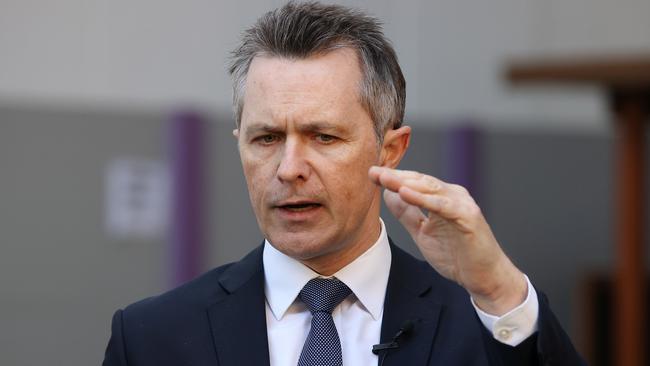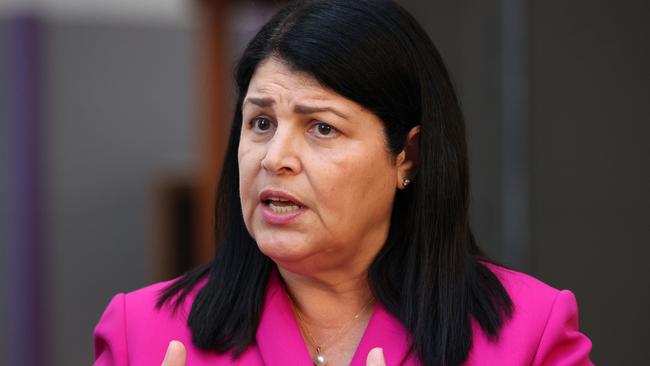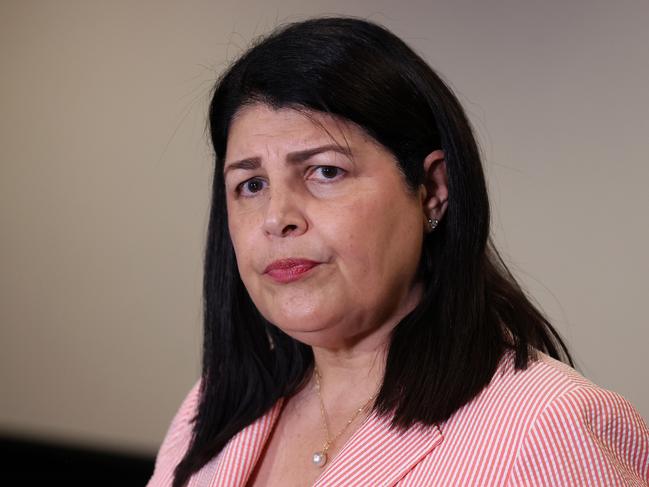Queensland introducing school mobile phone ban from 2024
The Education Minister has revealed more details about exactly how Queensland’s new mobile phone ban will work.
Education
Don't miss out on the headlines from Education. Followed categories will be added to My News.
Education Minister Grace Grace denied the government was playing catch up with its mobile phone ban in schools, saying times had moved on, as she revealed more details about how it will practically work.
There will be ban exemptions for students with medical reasons but exactly where students phones will be kept and what punishments will be handed out if the rule is breached will be left up to individual schools to develop, within certain guidelines.
Federal Education Minister Jason Clare strongly backed Queensland joining the ban, saying taking phones out of classrooms meant students “would be focused on the teacher, not focused on TikTok”.
The blanket mobile phone ban will begin from Term 1 in 2024 and include lunchbreaks.

WILL THERE BE EXEMPTIONS?
Ms Grace said specific details on how the bans works would be developed in the coming months with other states to ensure a nationally consistent approach to ensure students who live near the border or who move interstate are not impacted.
But she confirmed there would be some exemptions available and that parents would be educated on how the ban will work before it starts next year.
“We’ll spend the next couple of terms now working out these guidelines, working with the other states and territories, but also with parents,” Ms Grace said.
“The guidelines will have exceptions, of course, particularly for students who have health reasons why they may need to have their phone with them, and sometimes students need them for educational purposes as well.”
WHERE WILL STUDENTS’ PHONES BE KEPT?
Specifics on how the ban is implemented, such as where and how phones are kept, will be decided at a school level, the Minister said.
“If you’re in a very small school in regional Queensland, you might leave it in your bag or you might give it to a dedicated person,” she said.
“If you’re in an urban setting, where there are thousands of students, it might be that the school has those phones in their lockers or keep them in their bags. But they will be away for the day.
“How schools implemented them - the policy guidelines will give them the options to do that.”

HOW WILL STUDENTS BE PUNISHED IF THEY DON’T COMPLY?
Punishments for students who break the rules will also be determined by the individual schools and principals.
“Schools are already implementing this, 95 per cent of our schools are already doing this. Sometimes it’s just as simple as taking the phone off them and they don’t get it until they leave in the afternoon,” Ms Grace said.
“If there is someone constantly (breaking rules) principals and teachers know when they need to take the next step and they do it as a last resort and we’ve got a lot of trust in their judgment.”
WHY IS QUEENSLAND ONLY NOW DOING THIS?
While many other states have already implemented bans and 95 per cent of Queensland schools have already implemented some form of ban, Ms Grace denied the state was playing catch up.
“There’s no catch up. We’re already there. This is just about taking a uniform approach, covering breaks,” she said.
Ms Grace has previous pushed back against the ban and suggested it could “create more problems than trying to be solved”.
She said the problems she talked about were implementing the recommendations of the previous cyber-bullying taskforce.
“They looked at this extensively and they did not recommend a blanket ban. Now obviously, times have moved a bit,” she said.
“We didn’t want to disrupt what principals and school leaders were doing at that time.”
Education Minister Jason Clare strongly endorsed Queensland joining the mobile phone ban for schools.
“If you’re not focused on scrolling through TikTok or Instagram or whatever it is, because your phone’s not there, you’re more likely to be talking to your friends and playing with your friends in the playground,” he said.
HOW QUEENSLAND FINALLY BANNED MOBILE PHONES IN STATE SCHOOLS
A blanket ban on mobile phones and smartwatches from the first to last bell in all Queensland state schools will come into effect next year.
The statewide ban, which will include lunchbreaks, will be introduced for Term 1 in 2024, meaning children will be without phones during school hours.
Education Minister Grace Grace, who had refused to bring in a blanket ban just months ago, announced the decision on Thursday night after meeting with Australia’s education ministers to decide on a “national approach” to phone use in schools.
She had previously argued it could “create more problems than trying to be solved”.

Ms Grace said on Thursday the ban provided uniformity, would be extended to break times and include certain wearable devices like smartwatches. It will not apply to non-government schools.
“From Term 1 next year mobile phones will need to be away for the day in all Queensland state schools, building on the excellent work of our principals and school leaders to date,” Ms Grace said.
Queensland had been the only Australian state yet to agree to the blanket ban with the decision instead left up to individual school principals.
Ms Grace had repeatedly said the key reason she had refused to follow other states was because the State Government’s Anti-cyber-bullying Taskforce, established five years ago in the wake of bullied teenager Dolly Everett’s death, did not support the move.
However, the reasoning was pulled apart by the taskforce chair Madonna King, who said she would “fight like hell” to bring in a ban.
Her concerns triggered a state government review with the results of a statewide survey presented at national level on Thursday night.
Ms King previously said children with access to smart phones had skyrocketed in recent years, making them addicted to their devices and overreliant on them for communication.
Following thursday’s decision, Ms King said Queensland children were the real winners in the ban.
“There will be less bullying, less isolation, more social cohesion, more focus in class,” Ms King said.
“While she had to be dragged to the finish line, Grace Grace has finished strong.”
The independent review had been conducted by former Queensland Family and Child Commissioner Cheryl Vardon, with the full report due later this month.
“We are always happy to take a fresh look at things: the progression of technology and
proliferation of wearable electronic devices meant it was time to do a review, and I thank Ms
Vardon for her ongoing work,” Ms Grace said.
Ms Grace said 95 per cent of schools had an existing policy banning the use of phones during class times, many including at breaks.
Students will be allowed to bring phones to school to contact parents before or after school hours and some exemptions will be available for specific circumstances.




